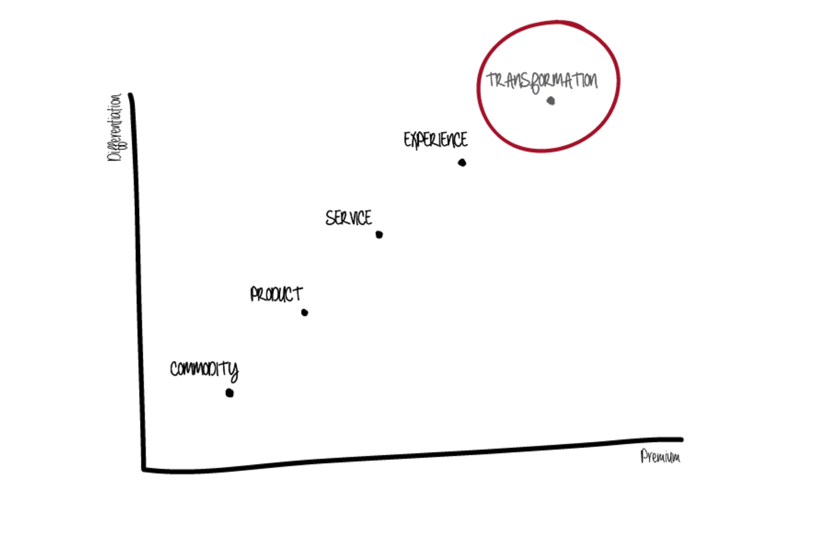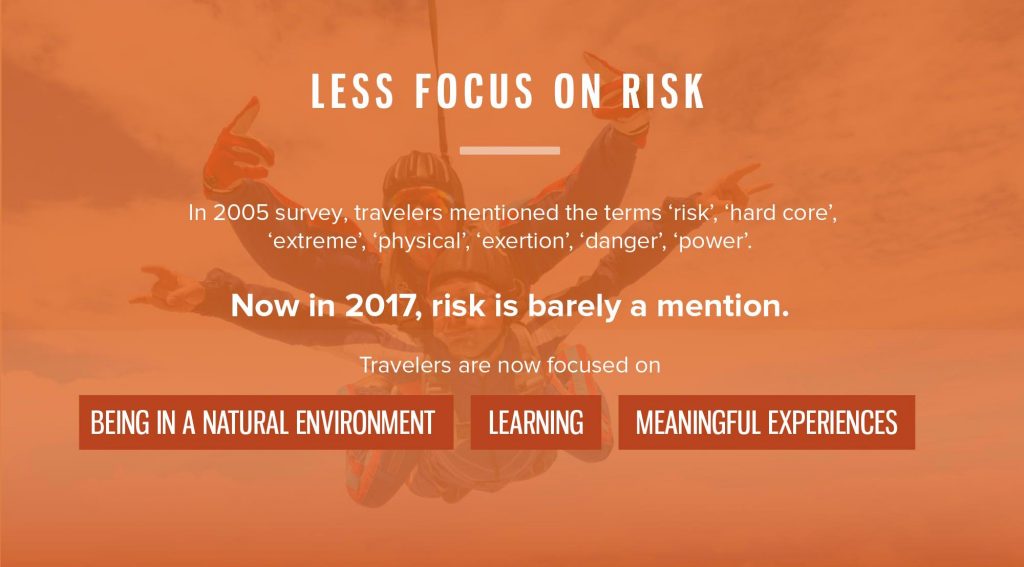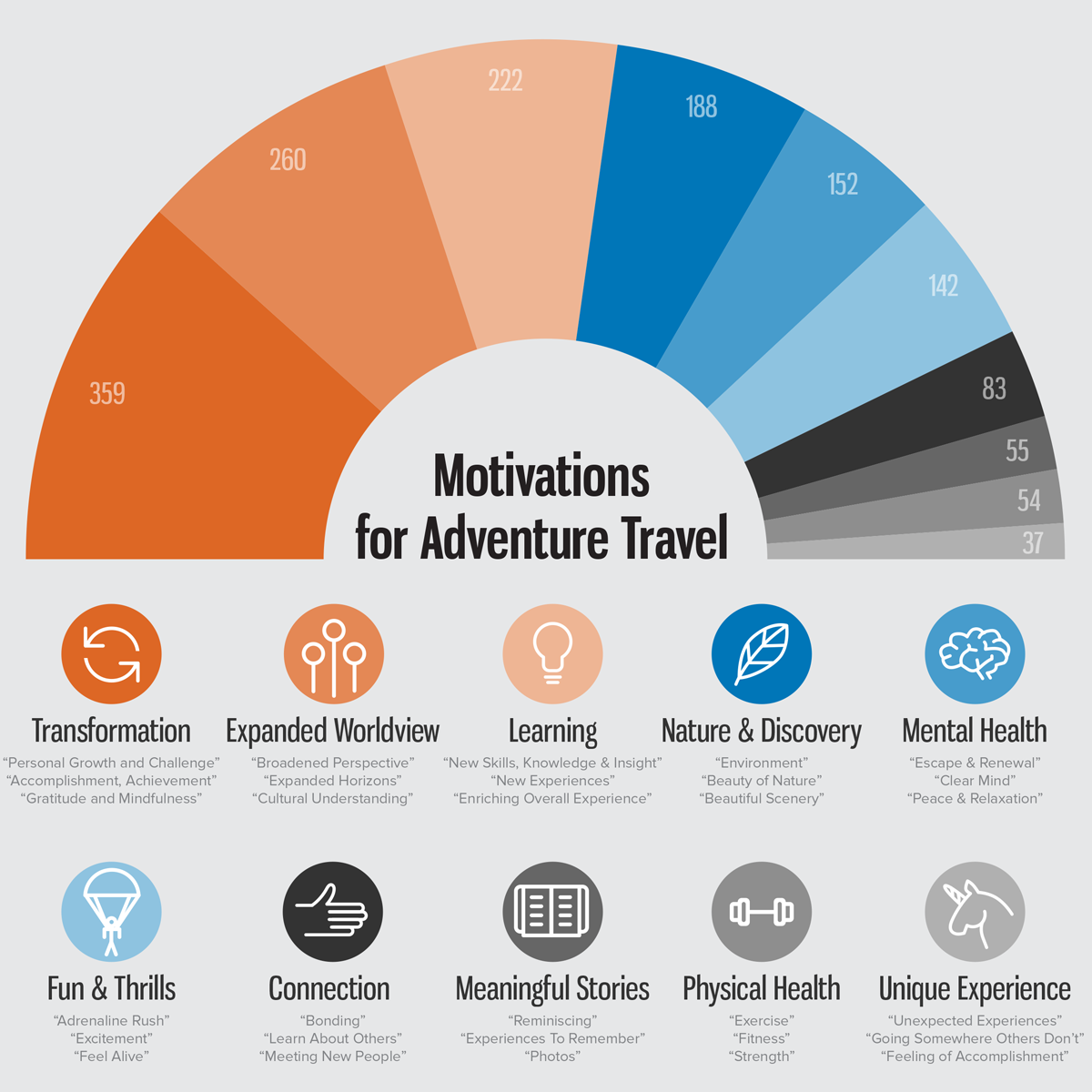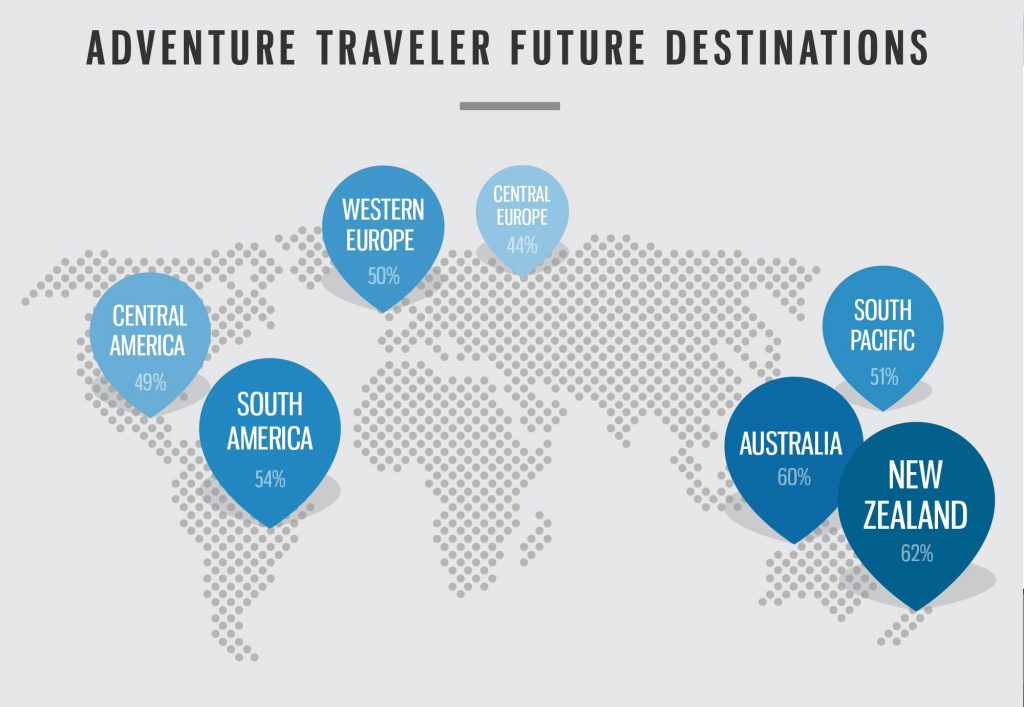New research conducted by the Adventure Travel Trade Association (ATTA) in conjunction with researchers from East Carolina University reveals that, more than any other motivating factor, adventure travelers are seeking transformative experiences.
In the past couple years, the term “transformation” has been used to describe what consumers seek from the goods and services they purchase. To delight today’s consumer, nothing short of a transformative experience – one that leaves a lasting change or impression – is required. The push for transformation is expressing itself across industries from health and wellness to fashion, and, yes, even travel.
On the cutting edge of this trend, the ATTA is releasing new relevant research conducted with longtime research collaborator, Dr. Paige Viren, showing the motivations for adventure travelers have changed in recent years. Working in partnership with Outside magazine, Dr. Viren’s research supports what has been under our noses for so long: Yes, adventure travelers crave transformative experiences. In fact, rather than accepting transformation as a happy byproduct of their quest for fun and thrills, adventure travelers are actively motivated by this desire for personal growth and change.
 There is good news in this research for businesses in the adventure travel industry: For some goods and services, delivering on a promise of transformation might be a tall order – one requiring fancy footwork from the marketing department – but in adventure travel, it is incredibly accessible.
There is good news in this research for businesses in the adventure travel industry: For some goods and services, delivering on a promise of transformation might be a tall order – one requiring fancy footwork from the marketing department – but in adventure travel, it is incredibly accessible.
Most adventure travel tour operators can recall stories of guests who had life-changing and meaningful experiences on their trips. This is what motivates many people to continue working in the field: the feeling of contributing to something worthwhile, the opportunity to provide a service that can transform how people view themselves and others, and the chance to inspire people to take action on issues important to all of humanity, such as the environment, social justice, and poverty alleviation. Perhaps even more than simply being in the “experience” business, the adventure travel industry may actually be a leader in the “transformation” business.
This new research not only validates their work, but offers insight into how to address adventure travelers’ interests when they seek transformative experiences.
The “New” Adventure Traveler Survey Findings
In 2008, B. Joseph Pine II and James H. Gilmore, authors of the well-known book “Authenticity,” explained how designing an experience for customers allows businesses to differentiate from competitors and enables them to offer a premium service. Addressing Adventure Travel World Summit delegates in São Paulo, Brazil, in 2008, Gilmore essentially said, “This is your industry. You are the epitome of the experience business.”
The next step, as the authors noted, was “transformation.” Other industry analysts at the time observed that, in the “transformation or contribution” economy, previously passive consumers would begin to “choose a product or service not only according to how closely it matches their likes and interests (product preference), but also on the basis of how it will transform them, their lives, or their ways of thinking (political, social, and moral inclinations).”

To best appreciate and understand the survey results from Dr. Viren’s most recent study, it helps to place them in context with traveler research on motivations from the past. In 2008, Dr. Viren surveyed National Geographic Adventure magazine subscribers and found travelers were seeking “risk and competence” and “new experiences,” and they had an interest in “novel experiences” as well as an “interest in other cultures.” A key finding from the research at that time was the importance travelers placed on culture. Personal growth was not a focused motivator for adventure travelers.
Dr. Viren’s most recent research, conducted with Dr. Alison K. Murray of East Carolina University, surveyed a similarly sized panel of Outside magazine subscribers in the fall of 2015. They spent the following nine months analyzing and synthesizing more than 1,000 write-in responses from adventure travelers.
Research Method
Using Outside magazine subscribers as a sampling frame, Drs. Viren and Murray surveyed a systematic random sample of subscribers. They received 1,017 usable surveys, representing the views of adventure travelers based in the United States, which were weighted to represent an even male/female split. The demographic profile was primarily married (62%) and Caucasian (89%).
Age breakout:
Adventure Traveler Motivations
Survey respondents noted their chief motivations for engaging in adventure tourism are to have a “life-changing experience” and enjoy “personal growth and challenge.” Travelers also said they wanted a sense of “accomplishment and achievement” and a feeling “gratitude and mindfulness.” In short, they’re looking for transformation.
The focus on culture, an important element of the research in 2008, has now morphed into “cultural understanding.” In other words, travelers are not content with just being in the presence of a new culture. They want to gain some understanding of it, along with a “broadened perspective” and “expanded horizons.”
Risk has historically been a core component of adventure travel that adventure experience suppliers and regulators have grappled with quite intensely, but travelers now place several elements ahead of risk when considering the key elements of “adventure.” In the past survey, respondents mentioned “risk,” “hardcore,” “extreme,” “danger,” and “power” among the elements playing an important role in adventure, but in the latest research they found that “being in a natural environment,” “learning,” “meaningful experiences,” and “being in a new culture” all supersede risk as an element of adventure.
 What does the new approach to risk mean for practitioners? Considering this research in tandem with recent U.S. adventure traveler research in which three primary adventure personas were defined, one hypothesis is that risk is now mitigated for travelers by the faith they put in their guides, and, in the case of enthusiasts, by the confidence they have in their own advanced skills.
What does the new approach to risk mean for practitioners? Considering this research in tandem with recent U.S. adventure traveler research in which three primary adventure personas were defined, one hypothesis is that risk is now mitigated for travelers by the faith they put in their guides, and, in the case of enthusiasts, by the confidence they have in their own advanced skills.
Destinations and Activities Top of Mind for Transformational Adventurers
In addition to revealing new insights with respect to traveler motivation, the recent survey also asked travelers about where they planned to visit and which activities they most associate with adventure tourism.
With respect to destinations, adventure travelers favor the following destinations and plan to visit them:
The activities most associated with adventure travel by the new adventure traveler are:
- Hiking - 90%
- Backpacking - 87%
- Trekking - 86%
- Kayaking (sea/whitewater) - 85%
- Rafting - 85%
- Climbing (mountain/rock) - 84%
- Mountain biking - 81%
- Scuba diving - 80%
- Caving - 79%
- Camping - 78%



